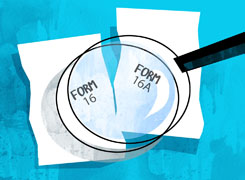Anil Rego | Answer |Ask -Follow
Financial Planner - Answered on Jun 09, 2022
He’s an expert in income tax and wealth management.
He has completed his CFA/MBA from the ICFAI Business School.... more

It's very informative to read your column in Rediff. I have some queries I hope you can help me with:
I have not worked since 2017, and there is no income. But I have some investments in equities and equity MFs long term.
Hope to hear your valuable answers on these questions.
My questions are:
1. If I redeem my MF how is the capital gain tax computed? I know that 10% is the tax on the gains. But since I have no income and as there is no tax for earning till 2.5 Lakh, and additionally 1 lakh (or is it 1.5lakh) on equity MF redemptions, can I deduct 3.5 lakh from the amount received through gains and apply 10% tax on remaining?
Anil Rego::The basic exemption can also be claimed additionally.
2. Also, what is the difference in terms LTCG on long term equities, long term equity MFs and long term balanced MFs?
Anil Rego::Balanced MFs with equity holding above 65% and equity MFs, both are treated as equity funds and will be taxed as equity fund. Balanced funds with equity less than 65% will be treated similar to debt funds (non-equity).
3. Can long term loss in equity sale be adjusted with long term gain of equity MF or only with similar equity gains? Please advise.
4. In case I withdraw my PF after the age of 58, is the amount not subject to tax?
It is not clear if you plan to start working again. Your EPF withdrawals post-retirement will be tax-free for up to 3 years after the account is inactive.You may like to see similar questions and answers below
Ajit Mishra | Answer |Ask -Follow
Answered on Jun 01, 2021
Tejas Chokshi | Answer |Ask -Follow
Tax Expert - Answered on Apr 25, 2023
Mihir Tanna |1090 Answers |Ask -Follow
Tax Expert - Answered on May 08, 2024
Samkit Maniar | Answer |Ask -Follow
Tax Expert - Answered on Mar 12, 2024
Ramalingam Kalirajan |10888 Answers |Ask -Follow
Mutual Funds, Financial Planning Expert - Answered on Dec 15, 2025
Reetika Sharma |425 Answers |Ask -Follow
Financial Planner, MF and Insurance Expert - Answered on Dec 15, 2025
Radheshyam Zanwar |6745 Answers |Ask -Follow
MHT-CET, IIT-JEE, NEET-UG Expert - Answered on Dec 15, 2025
Reetika Sharma |425 Answers |Ask -Follow
Financial Planner, MF and Insurance Expert - Answered on Dec 15, 2025
Ramalingam Kalirajan |10888 Answers |Ask -Follow
Mutual Funds, Financial Planning Expert - Answered on Dec 15, 2025
Ramalingam Kalirajan |10888 Answers |Ask -Follow
Mutual Funds, Financial Planning Expert - Answered on Dec 15, 2025
Ramalingam Kalirajan |10888 Answers |Ask -Follow
Mutual Funds, Financial Planning Expert - Answered on Dec 15, 2025
Ramalingam Kalirajan |10888 Answers |Ask -Follow
Mutual Funds, Financial Planning Expert - Answered on Dec 15, 2025
Ramalingam Kalirajan |10888 Answers |Ask -Follow
Mutual Funds, Financial Planning Expert - Answered on Dec 15, 2025
Ramalingam Kalirajan |10888 Answers |Ask -Follow
Mutual Funds, Financial Planning Expert - Answered on Dec 15, 2025
























.jpg)




